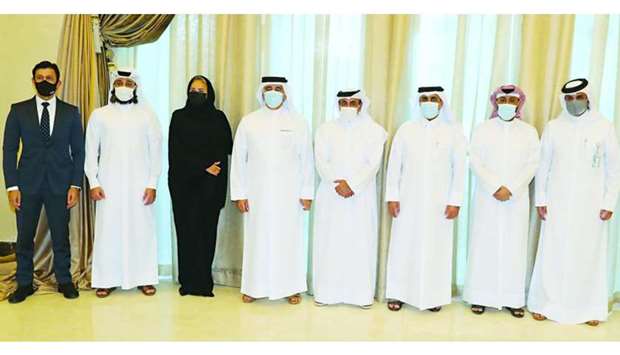The Ministry of Transport and Communications (MoTC) on Wednesday signed two MoUs within the framework of implementing its Electric Vehicle Strategy and providing charging units for free.
Nasser Bin Khaled & Sons Holding Co and Q-Auto are the signatories for providing the electric vehicle chargers and perform their periodic maintenance.
The charging units, which comply with the specifications issued by Qatar, will be installed at locations to be specified by MoTC.
The event was attended by HE the Minister of Transport and Communications Jassim Seif Ahmed al-Sulaiti.
Qatar General Electricity & Water Corporation (Kahramaa) president engineer Essa bin Hilal al-Kuwari, Nasser Bin Khaled & Sons Holding Co chairman Sheikh Nawaf bin Nasser bin Khaled al-Thani, and Q-Auto founding chairperson Sheikha Hanadi Nasser bin Khaled al-Thani were also in attendance.
The MoUs were signed by MoTC director of Technical Affairs Department Sheikh Mohamed bin Khalid al-Thani, Nasser Bin Khaled & Sons Holding Co managing director – Automotive Sheikh Faleh bin Nawaf al-Thani, and Q-Auto director of Operations Ahmed Shariefi.
“The MoUs come at a time when the country continues reinforcing the participation of the private sector in government developmental projects and encouraging its partaking in mobility and transportation projects in such a way that helps enrich private sector companies’ investment ideology, thus bolstering the localisation of expertise and the technology in use,” said MoTC’s Sheikh Mohamed.
Sheikh Faleh said NBK is glad to support Qatar’s strategy for sustainable development through promoting electric vehicles and providing their chargers.
"This co-operation with MoTC falls within NBK's national responsibilities for contributing to preserving the natural resources, protecting the environment, and supporting Qatar National Vision 2030, something which will positively impact the future of the nation and generations," he stated.
Shariefi said such a strategic partnership serves Q-Auto’s future vision on electric vehicles industry and coincides with their rollout of the first electric four-wheel vehicle in Qatar and the country’s efforts in this area.
The electric vehicle strategy backs the country’s agenda for a greener future and contributes to striking an economic-environmental balance in a way that ensures transportation sector’s infrastructure projects sustainability, supporting economic growth and making the most out of the natural resources.
This is a part of the overall MoTC strategy for providing an integrated, world-class, multimodal transportation system that offers safe, reliable, and eco-friendly services in line with the pillars of the Qatar National Vision 2030 for social, economic, and environmental development.
By 2022, it is expected that 25% of the public transit bus fleet in Qatar would have become electric. Public buses, government school buses, and Doha Metro feeder buses will gradually shift to electric power, thus hitting the rollout percentage that is required to reduce harmful carbon emissions from buses by 2030, in addition to honouring the concerted efforts that aim to maintain environmental sustainability.
The electric buses are planned to be used during the 2022 FIFA World Cup, a move that clearly demonstrates Qatar’s commitment to deploying universal clean energy solutions on transportation and supporting the determination to host an exceptional, ecofriendly, carbon-neutral event.
The charging units, which comply with the specifications issued by Qatar, will be installed at locations to be specified by MoTC.
The event was attended by HE the Minister of Transport and Communications Jassim Seif Ahmed al-Sulaiti.
Qatar General Electricity & Water Corporation (Kahramaa) president engineer Essa bin Hilal al-Kuwari, Nasser Bin Khaled & Sons Holding Co chairman Sheikh Nawaf bin Nasser bin Khaled al-Thani, and Q-Auto founding chairperson Sheikha Hanadi Nasser bin Khaled al-Thani were also in attendance.
The MoUs were signed by MoTC director of Technical Affairs Department Sheikh Mohamed bin Khalid al-Thani, Nasser Bin Khaled & Sons Holding Co managing director – Automotive Sheikh Faleh bin Nawaf al-Thani, and Q-Auto director of Operations Ahmed Shariefi.
“The MoUs come at a time when the country continues reinforcing the participation of the private sector in government developmental projects and encouraging its partaking in mobility and transportation projects in such a way that helps enrich private sector companies’ investment ideology, thus bolstering the localisation of expertise and the technology in use,” said MoTC’s Sheikh Mohamed.
Sheikh Faleh said NBK is glad to support Qatar’s strategy for sustainable development through promoting electric vehicles and providing their chargers.
"This co-operation with MoTC falls within NBK's national responsibilities for contributing to preserving the natural resources, protecting the environment, and supporting Qatar National Vision 2030, something which will positively impact the future of the nation and generations," he stated.
Shariefi said such a strategic partnership serves Q-Auto’s future vision on electric vehicles industry and coincides with their rollout of the first electric four-wheel vehicle in Qatar and the country’s efforts in this area.
The electric vehicle strategy backs the country’s agenda for a greener future and contributes to striking an economic-environmental balance in a way that ensures transportation sector’s infrastructure projects sustainability, supporting economic growth and making the most out of the natural resources.
This is a part of the overall MoTC strategy for providing an integrated, world-class, multimodal transportation system that offers safe, reliable, and eco-friendly services in line with the pillars of the Qatar National Vision 2030 for social, economic, and environmental development.
By 2022, it is expected that 25% of the public transit bus fleet in Qatar would have become electric. Public buses, government school buses, and Doha Metro feeder buses will gradually shift to electric power, thus hitting the rollout percentage that is required to reduce harmful carbon emissions from buses by 2030, in addition to honouring the concerted efforts that aim to maintain environmental sustainability.
The electric buses are planned to be used during the 2022 FIFA World Cup, a move that clearly demonstrates Qatar’s commitment to deploying universal clean energy solutions on transportation and supporting the determination to host an exceptional, ecofriendly, carbon-neutral event.

